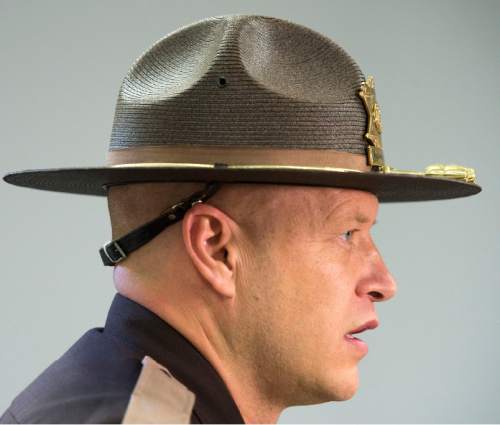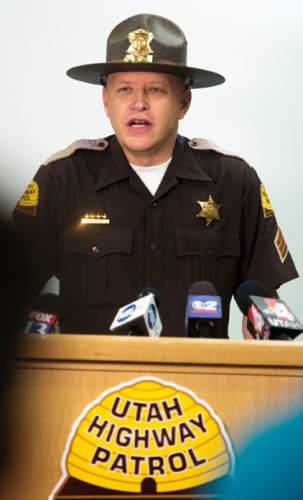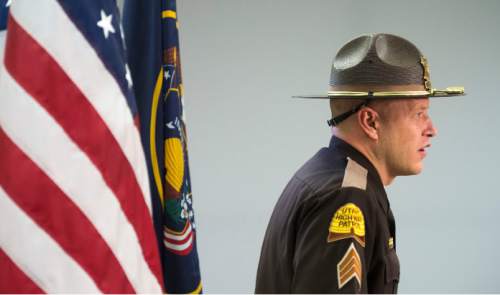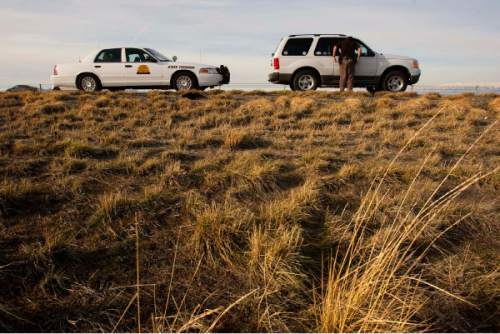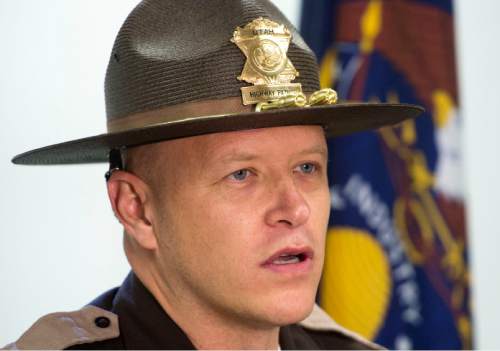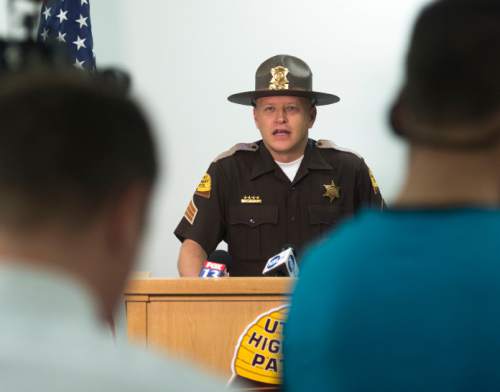This is an archived article that was published on sltrib.com in 2015, and information in the article may be outdated. It is provided only for personal research purposes and may not be reprinted.
Salt Lake County prosecutors have suspended all pending cases involving a former Utah Highway Patrol trooper who resigned last year amid allegations that he claimed to have, during a DUI arrest, administered field sobriety tests that he didn't actually perform.
All cases involving former trooper Neil Green are halted until prosecutors can review Green's contributions to each case, according to an unusual statement released Tuesday afternoon by Salt Lake County District Attorney Sim Gill.
Gill further said the UHP did not notify prosecutors of the investigation into Green; instead, his office discovered the issue as it tried to prosecute one of Green's cases in April, more than a year after Green had resigned.
"One lesson to be learned here is there is definitely a systemic breakdown," Gill said. "We need a mechanism by which to have more timely communications by which we can address these issues [of officer conduct]."
The announcement triggered reactions from both the UHP and Troy Rawlings, district attorney for Davis County, where Green made the 2013 DUI arrest that would lead to his resignation.
According to court records, Green arrested a driver in August 2013 on a previous warrant and also on suspicion of possession of drug paraphernalia, possession of less than an ounce of marijuana, driving with a measurable level of marijuana metabolite, and failure to signal for two seconds, all misdemeanors.
Green wrote in his reports that the driver had failed field sobriety tests and testified as much in a driver license hearing the next month.
But the following February, prosecutors who reviewed dash-cam video of the arrest found that Green had not performed field sobriety tests on the driver. They reported their findings to the UHP and dismissed Green's other cases in Davis County, Rawlings said.
"Green made the statement that he must have made an error in his report," and the case against the driver was dismissed, troopers wrote in a statement released Wednesday. But the UHP was concerned by Green's report and especially his subsequent testimony, said UHP Sgt. Todd Royce. Standard field sobriety test records report more than just whether the suspect failed or passed; officers also quantify suspects' performance on the tests, noting details as to how long they stand on one foot or how far they walk in a straight line, Royce said. Although Green maintained that he "just made a clerical mistake, that he had forgotten what was happening and that it was just a mistake," the department launched an internal affairs investigation in March 2014, Royce said; Green resigned two days later.
Internal affairs officers wrapped up their investigation in September, finding that they had insufficient evidence to prove Green "intentionally entered [field sobriety tests] in a fraudulent manner, but rather was very sloppy and lazy in his approach to the case," UHP wrote.
"The Utah Highway Patrol takes troopers' testimonies and troopers' integrity very seriously," Royce said. "This was a case in which a trooper was not forthcoming and was not honest in his testimony."
Green could not immediately be reached for comment Tuesday.
Gill said his office did not learn of the problem in Green's case until last month, when Green failed to show up to a preliminary hearing in a 2012 DUI stop he made in Sandy. Prosecutors who inquired after him discovered he had resigned more than a year earlier.
"Based upon information provided by the Utah Highway Patrol regarding Trooper Green's credibility, the district attorney's office has determined that it cannot prosecute cases where Trooper Green is the sole and exclusive source of material evidence in the case," Gill wrote. He estimated that 20-40 cases have been suspended — and he is still looking into how the findings may affect defendants who already were prosecuted with evidence provided by Green.
Meanwhile, he said, law enforcement officers and prosecutors need to clarify how they will meet their obligation, as defined by the U.S. Supreme Court, to disclose exculpatory evidence or evidence that could impeach prosecution witnesses.
"These are constitutional issues," Gill said. "There's an obligation to address them immediately. You can't ignore them. I don't think it's intentional, it's a lack of training and understanding."
Royce said there was "not any intention to be secretive" and UHP is trying to learn what its role is in disclosing potential problems with testimony.
"Is it the department's responsibility to notify every court that Trooper Green has had contact with, or is that the responsibility of the prosecutor's office that discovers this? When you're talking about a [statewide] agency, you're talking about over 100 different courts."
Royce also noted that UHP was "unaware that prosecutors in Davis County were not talking to Salt Lake County."
Rawlings, the Davis County Attorney, said he was "stunned" UHP didn't share his prosecutors' findings of Green's incorrect testimony with prosecutors handling Green's cases in other counties. He argued that courts have defined a "two-way obligation to disclose" evidence that may support a criminal defense.
"UHP should have told the [Salt Lake County] D.A.'s office, and the D.A.'s office should have asked," Rawlings said. "They can't rely on some outside third party. If UHP doesn't understand their basic obligation to disclose that, and prosecutors' offices don't understand their basic obligation to ask, we've got a serious problem in the state of Utah. We have a bigger problem than Neil Green."
Twitter: @erinalberty


